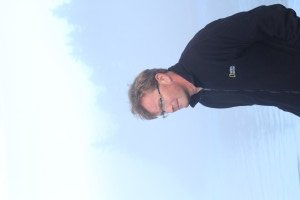Meet the Team: River Thame Catchment Partnership Officer
21st September 2015
Meet another member of our team, Andrew, who works with the Catchment Partnership for the River Thame catchment to improve the freshwater environment for wildlife and people
 Tell me your name…
Tell me your name…
Andrew Callender
And your job title?
River Thame Project Officer
What does that involve?
I’m the lead in the River Thame Catchment Partnership project, and deliver projects for the River Thame Conservation Trust. That covers almost everything from liaison with landowners over potential improvement of water environment, carrying out projects, setting up wildlife monitoring initiatives, co-ordinating the team of water quality testing volunteers across the catchment and trying to raise funds for new projects.
What’s so important about that?
We are trying to improve the water environment in the Thame catchment, an often forgotten catchment that has very few protected areas within it, and very little information about the wildlife there. The catchment suffers in places from pollution derived from agricultural sources, small local sewage treatment works and until recently period failures at the large Aylesbury sewage treatment works. There are also a lot of housing developments in the area so we are trying to talk to the developers about the impact the developments will have on the local freshwaters, and find ways to work together to increase the freshwater wildlife of the area.
One of main thrusts of my work is to encourage partnership with existing local groups such as the Watlington Environment Group (who are doing fantastic work improving the habitat in the Chalgrove Brook) and the Cuttlebrook Conservation Volunteers in Thame.
What is your favourite part of your job?
Gathering hard evidence so we can put together a case for improvements to habitats and tackle sources of pollution. For example a recent examination in the Holton catchment showed very clearly where the pollution sources are, but also identified some very good clean water courses. Indeed, if the sewage pollution can be improved, this could be a really good catchment given the way landowners are protecting the land.
And least favourite?
Writing reports that are filed unread is tough (I wouldn’t read them either, but it begs the question why they have to be written).
Although, my least favourite, because it is the hardest and most irritating, is trying to move organisations away from just focussing on large water bodies: the rivers and large lakes. Small water bodies like headwaters and ponds contribute so much to the wildlife of an area but it is not yet recognised by everyone. It will take a long time to change that mentality.
Why do you do it? What do you get out of it, and what keeps you going through the hard days?
I made a conscious decision 5 years ago to change my career entirely. I’ve always been very committed to conservation, I am an avid birdwatcher and love getting outside. Then, 5 years ago I went back to university to do a masters degree in environmental management, to show I wasn’t changing on a whim, that I was actually passionate about changing the environment around me. On the Thame there is the opportunity to do something in the local area that does produce real change.
What does freshwater wildlife mean to you?
It’s another part of the whole natural environment, one that I haven’t previously focussed upon or indeed paid much attention to. It’s something that I’ve come to find absolutely fascinating. When we moved here 8 years ago we dug a large pond in our garden and I’ve been watching it being colonised, recording the dragonflies and other wildlife. Finding a grass snake and being able to show it to my children and the neighbours was a real highlight. Making the pond is the best thing I’ve ever done in my garden and I’m not just saying that because of where I work!
What’s your favourite freshwater habitat?
My pond! It’s an experience of a new range of species. It was amazing how quickly invertebrates appeared so soon after it was dug, and the number of amphibians that turned up in the first spring. Kingfishers and herons visit – it’s amazing what visits, and what has colonised, especially as I live on top of a hill near no real stream or river. Favourites are definitely dragonfly larvae: beasts!
What got you interested in freshwater habitats?
It was an extension of my exploration of nature, learning about new species and ecosystems. Freshwater habitats are another area to explore. And being partially hidden underneath the water, it takes more effort to find out what’s there, but once you do see it, it’s amazing. Watching a dragonfly larvae emerging from the water and the new dragonfly breaking out is magical.
